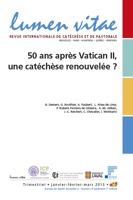 previous article in this issue previous article in this issue | next article in this issue  |

|
Document Details : Title: Quelle démarche de pardon pour des groupes et des collectifs? Author(s): RENIER, Louis-Michel Journal: Lumen Vitae Volume: 68 Issue: 2 Date: 2013 Pages: 159-165 DOI: 10.2143/LV.68.2.2981485 Abstract : Quand on dit «pardon et réconciliation», on pense immédiatement à la démarche personnelle que peut faire quelqu’un qui se dit pécheur. On pense moins aux réalités conflictuelles entre familles, groupes sociaux, ethnies et nations. Il y va d’une solidarité entre pécheurs qui veulent signifier, pour aujourd’hui comme pour hier, la grandeur de l’amour de Dieu et la nécessité de dire ainsi la fraternité entre les hommes. When we talk about 'forgiveness and reconciliation' we think at once of the personal process through which someone can go who admits to being a sinner. We think less about the conflictual realities between families, social groups, ethnic groups and nations. John-Paul II spoke in 1984 of social sin as a sort of addition, a concentration of personal sins. But can we stick to this additional perspective? As it is, just as the individual contributes to marking social space by means of his or her sin, so every person and his or her action is, in turn, marked by pre-existing social structures. It should therefore be possible to derive, from this observation, a ritualization that gives rise to a communal process with collective absolution. It is a matter of solidarity among sinners, who wish to testify, today as in the past, to the greatness of God’s love and the necessity of expressing in this way the fraternity of all human beings. |
